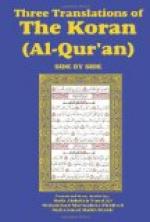12 Of their motives in embracing Islam.
13 The Adites are mentioned in vii. and xi.
14 This is to be understood of the small forts erected by the nomades of the Hejaz along the route of the caravans to guarantee their safety. Comp. Gen. xi. 1-10, and Sura lxxxix. 6, p. 54.
15 The Madian and the El-Aika of other Suras are unquestionably one and the same place, as they have the same prophet Shoaib (or Sho’eyb), the Jethro of Scripture-a name perhaps altered from Hobab (Numb. x. 29)-and because the same sin is laid to the charge of both. See Winer’s Realwrterbuch on Jethro. The Midr. Rabbah on Ex. ii. I6, Par. I, makes Jethro renounce idolatry, and his office of Priest, and undergo banishment from the Midianites.
16 Gabriel. See Sura lxxxi. 19, p. 46.
17 See Sura xiii. 36. This verse is said to have been revealed at Medina by Itq. 34.
18 The unbelieving Meccans. Lit. that the knowing (Doctors, Uhlemas) knew it.
19 Lit. have introduced it, i.e. infidelity; or, the Koran. Beidh. The latter interpretation seems most accordant with the context.
20 Comp. Sura xxxvii. 7, 8, p. 79.
21 It is probable that within three or four years from his entry upon the prophetic office, Muhammad had made about 40 converts. Some biographers refer to this passage, and not to Sura lxiv. I, as the first call to preach. But this Sura is itself late, and bears evidence of the opposition to which the prophet had become exposed, and of adherents to his cause, now become numerous. The diffuseness and feeblenss of the style clearly point to a late origin.
22 They impart to their votaries on earth what they have learned by stealth and partially, in heaven.
23 Muhammad found it necessary to employ the pens of certain poets to defend himself and his religion from the ridicule and satire of other poets, whose productions were recited at the great annual fair held at Okatz, the Olympus of the Hejaz. The poems which were judged the best were written up in letters of gold, or suspended (hence called Moallakat) in the Caaba. These poetical contests were subsequently suppressed by Muhammad, as offering openings for discussions which might prove inconvenient, and dangerous to his rising claims.
SURA XV.-HEDJR1 [LVII.]
Mecca.-99 Verses
In the Name of God, the Compassionate, the Merciful
ELIF. Lam. Ra.2 These are the signs of the Book, and of a lucid recital [Koran].
Many a time will the infidels wish that they had been Muslims.
Let them feast and enjoy themselves, and let hope beguile them: but they shall know the truth at last.
We never destroyed a city whose term was not perfixed:3
No people can forestall or retard its destiny.
They say: “O thou to whom the warning hath been sent down, thou art surely possessed by a djinn:




